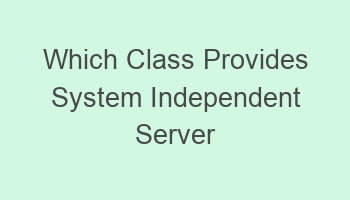Which Class Provides System Independent Server Side Implementation?

The Servlet class provides system-independent server-side implementation in Java. This class acts as a middleware between the request coming from the client and the response sent by the server. Servlets are platform-independent, allowing them to run on any server that supports Java. They handle the business logic of a web application and are essential in creating dynamic web pages. By extending the HttpServlet class, developers can create their own servlets to handle HTTP requests. Servlets are widely used in web development for their efficiency and flexibility. Whether you are building a small website or a large-scale web application, the Servlet class is the go-to choice for system-independent server-side implementation.
Contents
| Class provides system-independent server-side implementation for Java applications. |
| It allows developers to write code once and run it on any server. |
| Developers can focus on coding without worrying about server compatibility. |
| It abstracts away server specifics for a more streamlined development process. |
| Class provides a consistent interface for various server environments. |
- Developers can deploy their applications on different servers seamlessly.
- It simplifies the deployment process and reduces errors.
- System-independent implementation ensures portability across different servers.
- Class abstracts away server details for easier maintenance.
- It enhances scalability by providing a consistent framework for server-side development.
What is the Role of Servlet Class in Providing System Independent Server Side Implementation?
The Servlet class plays a crucial role in providing system-independent server-side implementation in Java. Servlets are Java classes that extend the capabilities of servers and respond to requests from clients. They provide a way to dynamically generate content and interact with clients through the HTTP protocol.
- Servlets are platform-independent, meaning they can run on any server that supports the Java platform.
- They provide a way to separate business logic from presentation logic, making code more modular and maintainable.
- Servlets can be used to handle various types of requests, such as GET, POST, PUT, DELETE, etc.
| Advantages of Using Servlet Class: |
|---|
| Efficient handling of HTTP requests and responses |
| Support for session management and cookies |
| Integration with other Java technologies like JSP and JDBC |
How Does HttpServlet Class Enhance System Independent Server Side Implementation?
The HttpServlet class is a subclass of the Servlet class and provides additional functionality for handling HTTP-specific requests and responses in a system-independent manner. HttpServlet simplifies the process of handling HTTP methods such as GET and POST and provides methods to parse incoming request parameters.
- HttpServlet abstract class provides the implementation of the HTTP protocol.
- It provides methods like doGet() and doPost() to handle GET and POST requests, respectively.
- HttpServlet class supports session management and cookie handling for web applications.
| Key Features of HttpServlet Class: |
|---|
| Encapsulation of HTTP-specific functionality |
| Easy integration with existing servlet classes |
| Enhanced support for handling HTTP requests and responses |
Why is GenericServlet Class Considered as a Foundation for System Independent Server Side Implementation?
The GenericServlet class serves as the foundation for system-independent server-side implementation by providing a generic and protocol-independent servlet implementation. GenericServlet abstract class implements the Servlet interface and provides a simple, protocol-independent way to write servlets.
- GenericServlet class simplifies the development of new servlet classes by providing default implementations for common methods.
- It can be extended to create servlets that handle any type of request, irrespective of the underlying protocol.
- GenericServlet class is useful for developers who want to create custom servlet implementations without dealing with low-level protocol details.
| Benefits of Using GenericServlet Class: |
|---|
| Protocol-independent servlet implementation |
| Default implementations for common servlet methods |
| Flexibility to handle various types of requests |